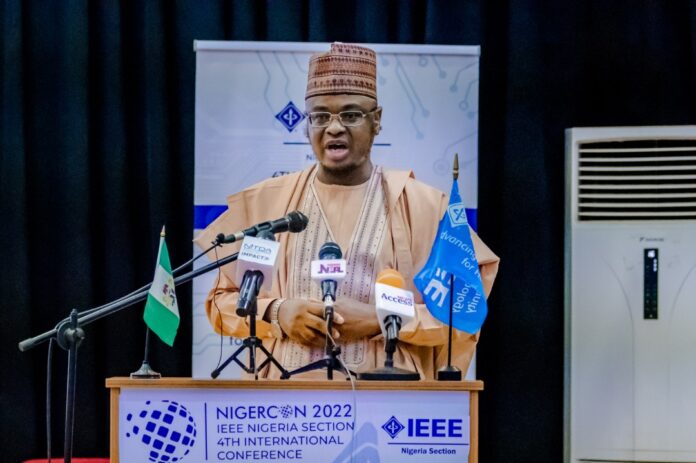Nigeria Will Soon Become Global Competitor In 4th Industrial Revolution – Prof Pantami
By Mubarak Umar
TECHDIGEST – The Minister of Communications and Digital Economy, Professor Isa Ali Ibrahim (Pantami), has said that Nigeria and other African countries are closing in to be part the 4th Industrial Revolution, giving consideration to what Nigerian young innovators have been doing.
Prof Pantami said this at the 4th Institute of Electrical and Electronic Engineers (IEEE) Nigeria Section Conference with the theme: ‘Disruptive Technology for Sustainable Development’ which took place in Nile University of Nigeria, in Abuja.
The Minister who delivered a paper titled: ‘Nigeria’s 5G Readiness and Impact on Digital Economy Mandate’ stated that the theme of this year’s event is in alignment with what the Federal Ministry of Communications and Digital Economy has been doing.
To achieve successful deployment of 5G in Nigeria, Prof Pantami said his ministry crafted a National Digital Economy Policy and Strategy for a Digital Nigeria, and President Muhammadu Buhari launched it on the 28th of November, 2019.
READ ALSO: ITU Appoints Pantami To Lead World Summit On Information Society Forum 2022
He summarized that “our journey in Nigeria, and our readiness with regard to the 5G deployment commenced with a launch of National Digital Economy Policy and Strategy on the 28th of November 2019.
“Prior to that, on the 25th of November 2019, we had 5G trial in six locations in Abuja, Lagos, Ibadan, Port Harcourt, Calabar and Kano. I personally did the trial. That trial was to allow the Federal Government and all other stakeholders have first-hand information about 5G. After the three months trial, we assembled a team of stakeholders from the public sector, private sector, academia, and many more where that team work on the outcome of the trial we earlier conducted.
“We also published another advert in two national dailies on the 11th November 2020, where we invited stakeholders to look into the summary of our trial and come up with contributions, observations and even constructive criticism where the need arises.
“22 personalities and institutions responded to that, where we received positive contributions from them. We set up another team to look into their own contributions, recommendations and even constructive criticism. So that team work on their contributions for almost four to five months.”
Prof Pantami recalled that, “We had a setback. We had a miscarriage. What happened was in June 2020 or there about, there was an allegation that 5G was linked with COVID19, to the extent that some intellectuals joined the allegation, intimidating government, that Nigeria was not ready for 5G deployment.
“And the issue was escalated to even our religious institutions where we were receiving reports that Nigeria was not ready – and 5G was related to COVID19. I said it, even on Channel Television that I personally did the trial of 5G in Nigeria, and at the same time, I did many COVID19 tests, all of them were negative. If there is any relationship between COVID19 and 5G, I would be the first victim. As at today, I did over 65 COVID tests in Nigeria and remain grateful to the Almighty.
“As government officials, we are always urge to listen to the complaints of our citizens, responsible complaints and even irresponsible ones and respond according to the demand of that situation.
“So, we put everything on hold and I directed the Nigerian communications commission to go out and create more awareness and they did that for almost six months.
“I received another invitation from the National Assembly that there was a petition in regard to COVID19, and I had to meet Mr. President and briefed him. He said go there and defend your ability, you can do that.
“We were at the national assembly, and with all sense of humility, they were all convinced. So, in September, 2020, the Federal Executive Council approved our national policy on 5G deployment for the digital economy sector,” he narrated.
Prof Pantami noted that 5G is part of the fourth Industrial Revolution and Emerging Technologies, and it is the only revolution that Africa is not far from the developed countries. If you look at the first, second and the third Industrial Revolution, there was a huge gap between Africa and the developed countries. This is the only industrial revolution that we are able to breach the gap significantly. And it is because of the fact that we are being proactive and at the same time, we are developing our talents.
The Minister remained confident that with deployment of 5G in Nigeria, the country stands a chance to be on the global stage and compete with other countries in 4th Industrial Revolution, which is more about communications, computerization, automation, and online activities.
He added that, “In 2019, I led a team of the Nigerian innovators to GITEX Future Stars in Dubai, and Chiniki Guard, an Artificial Intelligence (AI) platform that can track and monitor human activity and provide real-time updates emerged winner in the AI category.”
While making his goodwill message, the Director General, National Information Technology Development Agency (NITDA), Kashifu Inuwa, CCIE emphasized that disruptive technologies allow startups to enter market and sell their innovations.
He said, “today, we have the largest media platform, Facebook, with publishing articles, you and I publish for it. We have largest taxi company without a single car. We have the world’s largest hospitality company without a single a room, and all these are possible because of disruptive technologies.”
He quoted that by 2035, the value of disruptive technology is going to be one third of global economy, which is about $33 trillion.
The NITDA DG added that, President Buhari re-designated Ministry of Communications to Ministry of Communications and Digital Economy so that Nigeria can apply disruptive technology to create value in the economy.
“The Honourable Minister of Communications and Digital Economy, Professor Isa Ali Ibrahim (Pantami) formulated the policy, and NITDA’s role is to implement that policy by creating and enabling environment for our people to use disruptive technology for economic activities.
“At NITDA, we crafted Strategic Roadmap and Action Plan (SRAP) in line with NDEPS which has seven pillars, and three of those pillars are how it create an enabling environment for disruptive technology, which we do through what we call disruptive innovation.”
He explained that, “disruptive innovation is a process of applying disruptive technology to create a new market. Today, a 5-year-old fintech startup is two wide bigger than the biggest bank in Nigeria. This was possible because of the policy and enabling environment we are creating.”
In his remarks, the Vice Chancellor of Nile University, Professor Dilli Dogo, thanked the Federal Government of Nigeria for the continued support the University has been enjoying from the ministry.
















